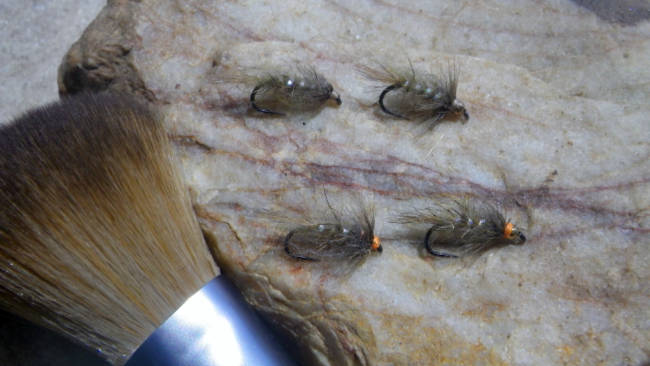


|

|
www.cjtu.org |
June 2023 |
General MeetingTuesday, June 13th, 2023
|
News & EventsPoint Mountain Stocking UpdateThe stocking team, working with Hunterdon County, finished the spring stocking on May 26th when we put another 190 rainbow trout into the Point Mountain stretch. This spring we put slightly over 1600 fish into the river. Since the Point Mountain stretch is a TCA, trout conservation area, the fish should hold over and provide some good fishing into the fall when we will stock again in October. I'd like to thank all the volunteers who helped out this spring. Your efforts are appreciated. Ed Kordyla CJTU stocking coordinator Fly of the MonthSoft Hackle Squirrel Nymph/EmergerTied by Bill Ninke
It’s “bug soup” time on our local rivers. Many different aquatic creatures are appearing or about to appear. So what fly should you be fishing in the river? In our local park and farm ponds bass and panfish are on their nests ready to consume any tasty morsel that appears near them. So what fly should you be fishing in these ponds? The answer to both these questions is this month’s fly. It’s a pattern of Arshad Khan, a British tier, with a soft hackle collar added. I first saw his pattern a few months ago on a video on his youtube channel which he maintains under the name makflies. Two things struck me initially about his pattern that made me want to tie and try it. First was its combination of profile, translucency and sparkle that just cried out “food, come eat me”. Second was the use of a makeup brush as a source of nice soft tail fibers. I had not seen this idea before so on my next trip to my local Walmart I browsed the ladies cosmetics section and found a brush like Khan used. The brush, pictured with the flies above, has many fine natural fibers bound together at the base with the pointed tips aligned. So to create a tail you just bend out a desired number of the fibers, hold them aligned while you clip them off and then tie them in. If the initial bundle is too large, just release a few until you get the exact amount you want before clipping. The released fibers are still attached to the brush so no waste. If the initial bundle is too small, just add a few more adjacent fibers before the clip. Clever, heh! Before tying my variant you might want to view Khan’s video at https://www.youtube.com/watch?v=AYZ6sbY4zlU&t=47s to see all this in action. Khan ties in the tail and holographic mylar rib, then splits the thread, inserts a light toned sparkly squirrel dubbing, closes the split and spins the bobbin to form a dubbing brush. He wraps this forward to about the one quarter point followed by the rib. I do the same. He then forms another split thread brush with a darker tone dubbing, winds to the eye and finishes the fly with a thread head. Final fly is well brushed out with a Velcro patch. I think this second split thread brush is more complicated and time consuming than needed and just spin dubbing on the thread for the darker tone front. I’ve experimented with splitting various threads for tying this and other patterns and have settled on Semperfli 6/0. If you have another favorite by all means use it. Khan custom mixes his dubbing but I’ve found that the Dave Whitlock SLF Dubbings work just fine. After fishing Khan’s pattern and seeing it in the water I thought it could use a small soft hackle at the head for a stronger head profile and added movement. I first considered partridge but then remembered the CDL Hen Cape I used in tying Talleur’s streamer in the December 2022 feature. The streamer uses the large feathers at the base. But the cape has many small well marked feathers at the top which make a wonderful soft hackle collar for this and other patterns. So that’s what I now use. Khan designed his pattern for trout and has reported good results. I’ve only been able to do warmwater fishing lately so I first fished the pattern in ponds as a dropper with a heavy “dragon fly like” nymph on the point. Almost all hookups were on this pattern. Then I put a bead head version of this pattern on the point. Bluegills and bass went crazy for this duo with singles on both versions and many doubles. Finally, as I was completing this writeup, it occurred to me that adding an orange “hot spot” might make this pattern even more effective. So I tied regular and bead head versions and included them in the photo. I haven’t tested them yet. So join me if you also are driven to experiment. Click here for the recipe! |
Central Jersey Trout Unlimited’s Supporters |